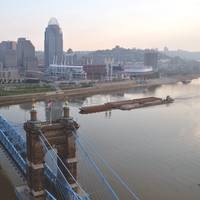Rolling on the River with CORBA

As the Central Ohio River Business Association (CORBA) pushes commerce on the Ohio River, stakeholders are beginning to take notice. On January 19, in an office tower overlooking the Ohio River, Eric Thomas convened the first meeting of 2017 for a business group working in the 13th largest port in the U.S.: the Ports of Cincinnati and Northern Kentucky (PCNK). Thomas serves as the Executive Director of CORBA – the Central Ohio River Business Association. PCNK’s high rank is likely a surprise to many.
The ATB – What Does The Future Hold?
The AT/B comes of age: operating coastwise, Jones Act – and beyond the horizon, too. A great deal has been written about the capabilities of the AT/B, or “Articulated Tug/Barge” unit in recent years. Without a doubt, though, the concept is firmly established as a viable ocean and coastwise transportation system in North America. But like any transportation asset, the concept has to not only expand its’ capabilities, but also conform over time to ever-changing rules and regulations. It must also be able to embrace and adapt to changes in technology that hold the promise of reduced emissions as well as savings in fuel and protection of the environment.
WCI Chairman on Lower Miss. Dredging Emergency
“The inland waterways navigation system is the most important transportation asset in the United States and is vital to the economic well-being of this country. From the inception of this country, the Federal government has played a critical role in ensuring that the inland navigation system, including the Mississippi River, remains open to transport products such as grain, coal, steel, petroleum and aggregate materials. We urgently call on the Federal government today to take all necessary steps to provide funding for this national transportation asset and to allow the Lower Mississippi River to remain fully open for commerce. This year, we have seen unprecedented levels of high water on the Mississippi River carrying millions of tons of silt and debris to the mouth of the River.
WCI Chairman Issues Statement

Rick Calhoun, President of Cargo Carriers (Cargill) and Chairman of Waterways Council, Inc., released a statement today regarding the state of emergency on the Lower Mississippi River. “The inland waterways navigation system is the most important transportation asset in the United States and is vital to the economic well-being of this country,” Calhoun said. “We urgently call on the Federal government today to take all necessary steps to provide funding for this national transportation asset and to allow the Lower Mississippi River to remain fully open for commerce.”
Ferries to Provide Assistance in Future Disasters
To address future disasters, the Bay Area Council is working in Sacramento with the governor and legislative leaders on major infrastructure bond proposals, which may well set the agenda for decades to come. Being discussed is the legislation authored by Sen. Don Perata, D-Oakland eight years ago, and signed into law by the governor, regarding the Bay Area Council’s proposal for a comprehensive high-speed water transit system that -- in addition to significantly improving daily traffic -- would provide a highly flexible disaster recovery transportation system. This new system recognized that the waters of the bay could be transformed from a transportation obstacle into a transportation asset, with high-speed ferries running to all communities with waterfront access.
Show Me the (Grant) Money
Following the mandates to enhance maritime security throughout the United States, programs were developed to make federal funds available to partially offset the costs being imposed on the private sector. The programs, which started off with great fanfare, are in danger of collapsing due to lack of continued funding by Congress and attempts by the Administration to siphon off monies for other missions. The first monies appropriated by Congress for port security grants were in the Department of Defense and Emergency Supplemental Appropriations for Recovery from and Response to Terrorist Attacks on the United States Act, 2002 (Pub.L. 107-117, January 10, 2002).









